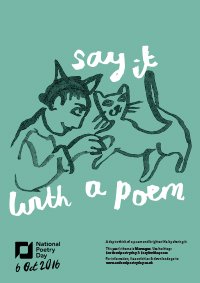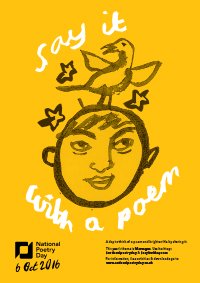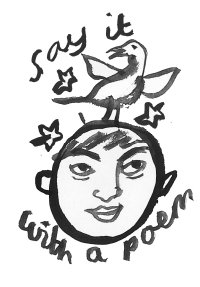National Poetry Day is here. It’s a day to indulge our love of the written and spoken word. It’s a day to celebrate everything that poetry can do. All over the UK, people will be discovering poetry for the first time, revisiting poetry after years of appreciation, writing poetry, discussing poetry, and living poetry. But how exactly can we celebrate National Poetry Day? Well here are 11 ideas for you…
1. Share the poems you love with the people you love
The theme for National Poetry Day 2016 is “Messages”. The slogan behind this year’s National Poetry Day campaign is ‘Say it with a poem’. This year, the emphasis is not only on poems about messages but on us using poems as messages.
- Send emails to your friends and family with your favourite poems. You could even personalise the messages so each person receives a different poem based on what you think they might like/your relationship with them.
- Print out and display poems freely wherever you are. Pin a poem to your school/work bulletin board. Leave poems printed off wherever you go: the cafe, the library, your friend’s house.
- Put your favourite poems up on social media.
Don’t feel embarrassed about this. Most people will appreciate getting a lovely poem sent to them from someone they care about.
Make sure you tailor the poem to whoever you’re sending it to. For example, my brother will be getting a dirty limerick but my girlfriend will be getting something romantic. Actually… Maybe I’ll switch that around. Might be more interesting that way.
2. Write your own poem
There’s nothing quite so satisfying as penning your own poem. Finishing your own poem and reading back the result makes you feel like you’ve just completed a tricky crossword puzzle and created a beautiful watercolour at the same time.
The best book I’ve ever read on the subject of creating your own poetry, and one of my favourite books of all time, is The Ode Less Travelled by Stephen Fry. If you have even a passing interest in poetry, you’ve got to get this book. I credit this book for helping me achieve 100% in my English GCSEs due to all the poetical terminology I learned. Mr Fry was also responsible for me filling about 200 notebooks with increasingly less embarrassing poetry between the ages of 14 and 18.
Pick up the book, read through the first chapter on National Poetry Day, and complete the poetry writing assignment. You’ll have a blast. Then, if you’re feeling brave, share your composition with someone else as per the first suggestion on this list.
3. Treat yourself to a poetry collection
What better day to purchase a poetry collection and slap it down on your bedside table with the commitment to read a poem each night?
There are many wonderful poetry collections available. Here two to get you started:
- “Messages”: A National Poetry Day Book – You can download this anthology for free from the National Poetry Day website. Poets Deborah Alma, Liz Brownlee, Paul Cookson, Sally Crabtree, Joseph Coelho, Jan Dean, Matt Goodfellow, Sophie Herxheimer, Rachel McCrum, Brian Moses, Michaela Morgan, Rachel Rooney, Joshua Seigal and Roger Stevens have contributed a poem along with their reason for writing it and have also chosen a poem from another poet and their reason for choosing it.
- Poem a Day – The Poem a Day series is one of my favourite. I loved opening the book up and seeing what new poem I got to kick off my day. I felt like a kid opening their Christmas calendar each day.
4. Watch a poetry related film
After a day full of poetry reading and writing, why not grab some popcorn, dim the lights, and settle in for a good poetry-related movie with some friends or family. Here are a few recommendations:
Dead Poets Society
HOWL
Sylvia
5. Listen to a poetry recording
Personally I get a lot more out of listening to poetry read by an expert speaker than reading poetry quietly to myself. Listening to poetry unlocks much more of its magic. Here are a few recordings that I love:
Under Milk Wood by Dylan Thomas, read by Richard Burton
Ode to a Nightingale by John Keats, read by Benedict Cumberbatch
O Captain! My Captain! by Walt Whitman, read by Tom O’Bedlam
The Long War by Laurie Lee, read by Alan Rickman
6. Teach a poem to someone else
Poets.org will give you a poem each week accompanied by notes on how to teach the poem. It’s mainly aimed at high school teachers but we can all benefit from this series. You don’t need to be a teacher in order to get something out of this. You’ll get a poem you’ve likely never read before, then you’ll get to better understand it with the accompanying notes and tasks, then you can share the poem with a friend or family member and teach them a little bit about it.
7. Sign up for a poem a day
If you talk to me for more than five minutes, you’re inevitably going to hear me bore you to death about the Bradbury Trio. It’s a reading assignment I set myself a year ago that involves me reading one poem, one short story, and one article every day. What better way to kick off this habit yourself and have a brand new poem delivered straight to your inbox every day than to sign up for the poets.org poem a day newsletter?
You’ll even get accompanying readings and commentaries of the poems by the poets themselves. How cool is that? Logging into your inbox has never been more fun!
8. Visit a poetry reading
If you’re in London on the 6th of October, check out The Poetry Society’s National Poetry Day Live Event at the Southbank Centre from 1-6:30 pm. It’s completely free and will have readings, workshops, and activities for all ages. Check it out.
You can find more poetry events all over the country and find out what’s happening near you by checking out the map at the National Poetry Day Website.
Can’t make it to a live poetry reading? You can always catch one on Periscope.
9. Memorize a poem
Ted Hughes edited a fantastic book of poems with the express purpose of providing you with inspiration for poems to memorise. He tells you a neat memorisation trick in the introduction and then gives you 101 poems to commit to memory. I’ve just memorised one of my favourites, ‘The Skunk’ by Seamus Heaney.
10. Learn how to read a poem
My number one suggestion for learning how to read a poem, and thus vastly increasing your ability to appreciate a poem, is to read through The Ode Less Travelled. All The Fun’s In How You Say A Thing is another great option if you’re interested in the nitty gritty of meter and versification.
You can also check out this great guide from poets.org on how to read a poem.



